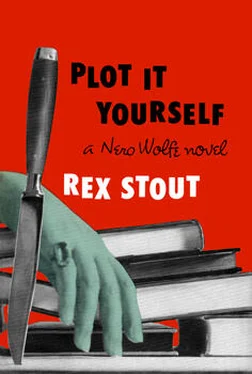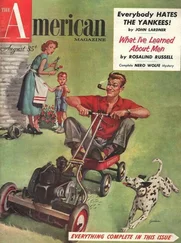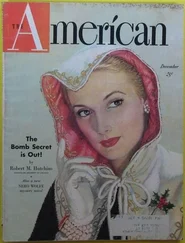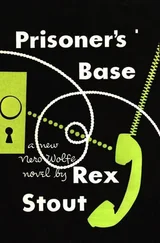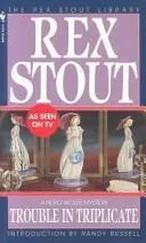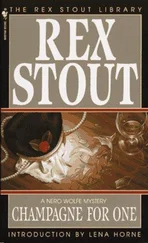Wolfe grunted. “No wonder you want to confirm my conclusion. What about the routine? Is it still assumed that the body was taken there in a motor car?”
“Yes. Or a helicopter or a wheelbarrow.”
Wolfe grunted again. “I am aware, Mr. Cramer, that you are too canny to jump to conclusions. I’ll lump a hundred questions into one. Have you learned anything helpful from inspection of the scene, or examination of the body and clothing, or random inquiries?”
“Yes. That the blade of the knife was an inch wide and at least five inches long, that there was probably no struggle, and that he died between nine and eleven Monday night.”
“Nothing else?”
“Nothing worth mentioning. Nothing to chew on.”
“You have of course inquired about the payments made to Alice Porter, Simon Jacobs, and Jane Ogilvy, in settlement of the claims. If our theory is sound, substantial portions of those payments eventually found their way to another person.”
“Certainly.”
“Then who?”
“There is no record. In each case the check settling the claim was deposited and then a large amount was withdrawn in cash. We’re still on that, but it looks hopeless.”
“A moment ago, speaking of Mrs. Jacobs, you said, ‘She says.’ Do you question her candor?”
“No. I think she’s straight.”
“And she has no idea where her husband was going, or whom he was going to see, when he went out Monday evening?”
“No.”
“Did he have anything with him that was not found on his body?”
“If he did she doesn’t know it.”
Wolfe shut his eyes. In a moment he opened them. “It is remarkable,” he remarked, “how little a large group of competent trained investigators can gather in a night and a day. I intend no offense. You can’t pick plums in a desert. Archie. Type this with two carbons: ‘I acknowledge receipt of (list the items) from Nero Wolfe, as a personal loan to me. I guarantee to return all of the above-named items, intact, to Nero Wolfe not later than seven p.m. Friday, May 29th, 1959.’ Make a package of the items.”
“One thing,” Cramer said. He put the cigar in the ashtray on the stand at his elbow. “You’ve got a client. That committee.”
“Yes, sir.”
“Okay, that’s your business. My business is to investigate homicides as an officer of the law. I’ve answered your questions because you’ve got something I need and we made a deal, but that doesn’t mean I’m sanctioning your horning in on my business. I’ve told you this before and I’m telling you again. Watch your step. Some day you’re going to lose a leg, and don’t expect me to give a damn.”
“I won’t.” Wolfe eyed him. “I promise you, Mr. Cramer, that I will never plead your sanction to justify my conduct. My engagement with my client is to catch a swindler. Apparently he is also a murderer, and if so your claim will be superior. If and when I get him I’ll bear that in mind. I don’t suppose you challenge my right to expose a swindler?”
The rest of it was rather personal. I was busy typing the receipt and guarantee and then collecting the items and making the package, so I missed some of it. When I was tying the string it occurred to Cramer that he wanted to check the items against the list in the receipt, so I had to unwrap it, and then it occurred to him to ask about fingerprints on the manuscripts. You mustn’t judge his abilities as a police inspector by that performance; Wolfe always has that effect on him. He gets behind.
When I returned to the office after letting him out it was only half an hour till dinnertime, and Wolfe had opened a book, not by a member of the committee, and was scowling at it, so I went for a walk. His brain works better when he is sitting down and mine when I am on my feet. Not that I would dream of comparing mine with his, though I do believe that in one or two respects — Oh, well.
Back in the office after dinner, and after coffee, I said politely that if I wasn’t needed I would go and do a couple of personal errands. He asked if they were urgent, and I said no but I might as well get them done if we had nothing on hand.
“That’s uncalled for,” he growled. “Have you a suggestion?”
“No. None that I like.”
“Neither have I. We have never been in a comparable situation. We can’t explore motives; we know the motive. We can’t set a trap; where would we put it? We can’t ask questions of people; whom would we ask, and. what? The forty-seven that Mr. Cramer’s men have already seen and will see again? Pfui. Five hours for each would take ten hours a day for three weeks and more. We’re almost as badly off as on Monday, when I told that confounded committee that it was no longer my kind of job and then idiotically consented to proceed with the plan proposed by Mr. Oshin. I admit it might have worked if we had taken proper precautions. Now Simon Jacobs is dead. I invite suggestions.”
“Yeah. When I went for a walk you knew I wanted to think. I did. When I got back you knew from the expression on my face that I was empty, and I knew you were. The best I can do is remind you that thinking is your department. I haven’t pestered you, have I? I know darned well it’s a beaut.”
“Then I have a suggestion. I don’t like it, but we must either act or capitulate. You told Mr. Oshin on Monday that Jane Ogilvy might grab at the bait or she might spurn it. We have his ten thousand dollars and Mr. Dexter’s offer to make any necessary contribution. It may be worth trying.”
“It may,” I conceded. “Wait till you see her.”
“I’m not going to see her. That’s for you. You are adept at dealing with personable young women, and I am not. Of course you will be severely handicapped. For Simon Jacobs you were provided with agreements by Richard Echols and Title House not to prosecute or demand reimbursement. You can’t offer that inducement to Jane Ogilvy. She won her case in court, and even if we could get a similar agreement from Marjorie Lippin’s heirs and from Nahm and Son, her publishers, which is doubtful, again our plan would be known to a number of people.”
“Then it’s a hell of a suggestion.”
He nodded. “But it leads to another. From Jane Ogilvy’s testimony at the trial, and from your report of your encounter with her, I gather that she is daft, and therefore unpredictable. Another approach might get her. Appeal to her sensibilities. Disclose the situation to her, all of it. Explain why we know that her claim against Marjorie Lippin was instigated by some person unknown to us, X. That X, threatened by imminent exposure, killed Simon Jacobs. Describe the grief and the plight of the widow and children; you might take her to see them and talk with them. Can you get a photograph of the corpse?”
“Probably, from Lon Cohen.”
“Show it to her. Get one that shows the face, if possible; the face of a dead man before it has been rearranged is much more affecting than a mere heap of clothing. If you can’t stir her sympathy perhaps you can arouse her fear. She is herself in peril; X may decide that she too must be removed. It would probably be a mistake to try to get her to supply evidence and details of her association with X, of the swindling of Marjorie Lippin; that would scare her off; all you really need is his name. Once we know him he is doomed. I want your opinion.”
I glanced at the clock: ten minutes past nine. “It may take a while to find Lon. After seven o’clock there’s no telling where he is. And the photograph would help.”
“You think it’s worth trying?”
“Sure. It may work. We’ve got to try something.”
“We have indeed. Then as early in the morning as may be.”
I turned to the phone and started after Lon Cohen.
Читать дальше
